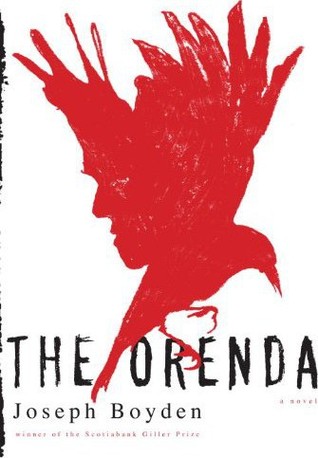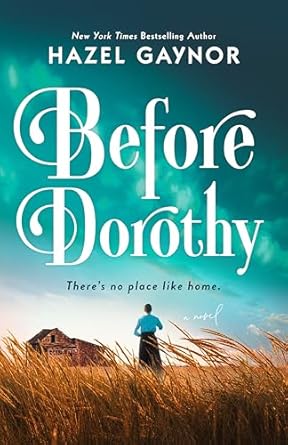A visceral portrait of life at a crossroads, The Orenda opens with a brutal massacre and the kidnapping of the young Iroquois Snow Falls, a spirited girl with a special gift. Her captor, Bird, is an elder and one of the Huron Nation's great warriors and statesmen. It has been years since the murder of his family and yet they are never far from his mind. In Snow Falls, Bird recognizes the ghost of his lost daughter and sees the girl possesses powerful magic that will be useful to him on the troubled road ahead. Bird’s people have battled the Iroquois for as long as he can remember, but both tribes now face a new, more dangerous threat from afar.
Christophe, a charismatic Jesuit missionary, has found his calling amongst the Huron and devotes himself to learning and understanding their customs and language in order to lead them to Christ. An emissary from distant lands, he brings much more than his faith to the new world.
As these three souls dance each other through intricately woven acts of duplicity, small battles erupt into bigger wars and a nation emerges from worlds in flux.
ebook, 448 pages
Published September 10th 2013 by Penguin Group (first published September 1st 2013)
ISBN13 9780143189404
About the Author
The book title is explained at one point: “...these sauvages believe that we all have within us a life force that is similar, if you will, to our own Catholic belief in the soul. They call this life force the orenda.”
This story covers the volatile relationship between the Iroquois and Hurons, and their early encounters with the French in Canada. It revolves around Bird, who is a Huron elder, the young girl he has kidnapped from an Iroquois tribe and adopted as his daughter, and a Jesuit priest by the name of Cristophe.
Bird is a well-respected elder in his tribe, and he lost his wife and daughters in a slaughter by the Iroquois. He relies on his good friend Fox, who always supports him in everything, and he has the medicine woman Gosling (a traveler from a northern tribe) to warm his bed and share her visions of the future and lend Bird advice.
"We aren’t the masters of the earth. We’re the servants."After a raid on a group, Bird kidnaps a young Iroquois girl by the name of Snow Falls and decides to adopt her as a replacement for his lost wife and daughters. This is the way that these tribes have settled things for years. Tit for tat, including taking members of the enemy tribe as replacements for lost family members, or as slaves, or simply to torture to death and sometimes cannibalize to make things even. It's their own brand of justice.
Snow Falls is viewed as being "special". Somewhat spiritual, even mystical, it seems she may come from a well-respected and high-ranking family.
"I am Snow Falls. I am the western door of the five nations of my people. I am a Seneca, an Onondawaga of the Haudenosaunee.”Initially her hatred for Bird is palpable, but over time she does come to view him as a father. She is torn and conflicted over the years, realizing she is basically a woman without a tribe. No longer Iroquois, but also not Huron, she doesn't really fit anywhere.
Cristophe is a Jesuit missionary trying to bring the word of God to the "heathens" in the wilds of Canada, and he is captured by Bird along with Snow Falls. Cristophe was found to be so annoying that he had found himself abandoned in the wilderness by the Algonquin with whom he was traveling:
“One heathen even began to loudly suggest I was a demon in human form. But it’s when we came across a barely cold Iroquois campfire that the Algonquin made their decision. That afternoon, after they inspected the camp, silent and cautious as wolves, and just as I was relieving myself behind a clump of willow, they climbed into their canoes. They’d deposited my black cloth bag containing my chalice and diary and few personal possessions on the shore, along with a small sack of food. I emerged from the bush and watched as they paddled away at speed.
The more I shouted for them to come back, the faster they worked to get away.”
He is an honest man, and a man of strong faith. His faith carries him through his years with the Huron, and helps him endure many trying times.
I had no idea just how brutal the Huron and Iroquois could be to one another or to outsiders. The book incited my curiosity, and I looked up the fact that they tortured and cannibalized their victims. Good grief! The account that I read of a Jesuit priest that survived after watching his Jesuit brothers tortured and burned alive went on and on, page after page. I thought it would never end! It was absolutely hideous!
And all the while, these tribes are being decimated by small pox brought by the French.
I grew to like the characters later on in the story, but early on I had a hard time liking any of them. The first half was more the “savage” side of the natives, and the latter half was the human side. And Cristophe was pretty weak and annoying early on, but he gained strength along with his faith, and became the epitome of humanity and self-sacrifice.
Overall I thought this was a pretty great read. I found it was often hard to tell the narrator, as it alternated the chapters between Bird, Cristophe, and Snow Falls. And I found the pace of the story a bit like a car ride with my mother: I desired a gas pedal, so as to speed our progress a little faster, feeling we were always going 4 mph too slow. And at times I struggled with the likability (or lack thereof) of the characters, but mostly I found the writing engaging and the storyline interesting, and I enjoyed getting a glimpse into the lives of the tribes that thrived in the Canadian wilderness.





















No comments:
Post a Comment